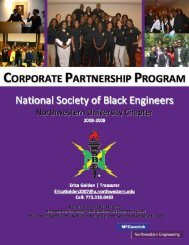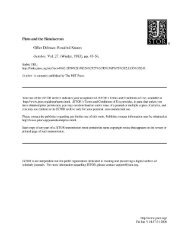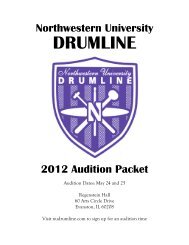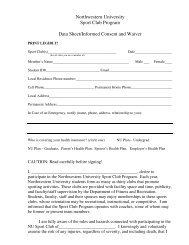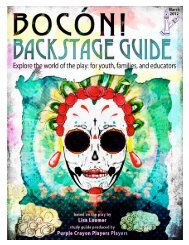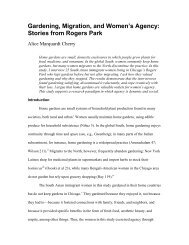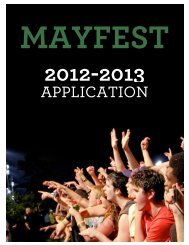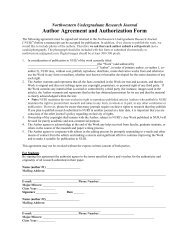Oral Qualifier FAQ - Associated Student Government, Northwestern ...
Oral Qualifier FAQ - Associated Student Government, Northwestern ...
Oral Qualifier FAQ - Associated Student Government, Northwestern ...
Create successful ePaper yourself
Turn your PDF publications into a flip-book with our unique Google optimized e-Paper software.
<strong>Oral</strong> qualifier <strong>FAQ</strong> <br />
Eric Perreault <br />
(1) Does the committee know how many people are planning on taking the exam I can think of <br />
at least 8, but what happens when 12 sign up <br />
Yes. We have this under control and are planning accordingly. <br />
(2) How are we evaluated (Grades, written proposal, publications, conferences, ability to <br />
answer questions during the defense period, etc) <br />
This is an oral exam based on a research proposal each student will submit. The students are <br />
judged on the quality of the written proposal and on their ability to present and defend that <br />
proposal to the standing committee. The most important component, however, is the ability <br />
to respond to questions posed by the committee. <br />
(3) What happens with people whose advisor or committee members are on the standing <br />
committee <br />
Advisors are not allowed to participate in the oral examination of their students, although <br />
they may be present (and silent) if they so choose. To date, I do not believe that any advisors <br />
have been present for the examination of their own students. <br />
(4) Can we have committee meetings between now and then, especially for 4 th year students <br />
who need a meeting soon <br />
Yes. <strong>Student</strong>s should continue with regularly scheduled committee meetings, although they <br />
should not be presenting the research proposal to their committee before the oral qualifier. <br />
(5) Is there a target pass/fail rate <br />
Yes. Our target is that all students pass the exam. Unfortunately, this does not always <br />
happen. <br />
(6) If someone does not pass, what are the implications/next steps <br />
This is handled on an individual basis in consultation with the student’s advisor and the <br />
graduate committee. Potential implications could include, but are not limited to the <br />
following: a request to take additional courses, a retake of the exam, or being asked to leave <br />
the program.
(7) What is the tolerable level of advisor involvement <br />
Advisors may not write or substantially edit any portion of the proposal. They are <br />
encouraged to provide students with exemplary sample proposals and to discuss research <br />
objectives. Advisors also may review the first draft of the proposal to provide comments on <br />
appropriate structure and format, but may not rewrite any portions of the text. <br />
I also strongly encourage students to practice their oral presentation to fellow graduate <br />
students before the oral exam. At this practice, the audience should be encouraged to ask <br />
detailed questions broadly relevant to the proposal to simulate the format of the <br />
examination by the standing committee. The goal would be to help the student identify any <br />
areas of weakness that should be strengthened prior to the exam. At least some students <br />
outside of the research lab should be included in the audience. <br />
(8) Do people need to be prepared to answer questions that have nothing to do with their <br />
project For instance, tissue engineering for someone doing systems-‐level neuro. <br />
No. All questions will be relevant to the proposed research. However, this includes a broad <br />
understanding of the basic science, relevant principles and methodologies. For example, <br />
students should be prepared to describe the physical principles and limitations of any <br />
measurement technique essential for their proposed research. <strong>Student</strong>s also should be <br />
prepared for relevant topics that may not directly impact the research outcomes but are <br />
closely related to the proposed studies. For example, if someone is using diffusion-‐weighted <br />
imaging, basic questions about the diffusion process would be appropriate. <br />
In summary, a successful student will not only be able to describe the research plan and its <br />
significance but also will be able to defend this plan by being able to provide a rationale for <br />
the proposed methods, to contrast them with reasonable alternatives and to display a <br />
mastery of the related scientific and engineering principles. <br />
(9) What is the intended ‘audience’ for our written proposal and presentation <br />
The examining committee. This will be comprised of faculty with a broad range of interests <br />
and expertise. Hence, the presentation should not be targeted solely to experts in the <br />
student’s area of study, but to a more general audience with a strong technical and medical <br />
background. <br />
(10) The fact that advisors do not know how much they can be involved, in addition to the fact <br />
that quota rumors have been allowed to persist, gives the perception that the faculty are <br />
divided over the qualifier. <br />
We discussed and clarified the purpose of this exam at our faculty retreat in December and <br />
there was no dissent. Any advisors who continue to have questions or suggestions are free to <br />
contact me at any time, as are students.
(11) What is a reasonable amount of time to spend preparing the document and presentation <br />
It is not really possible to provide a general answer to this question, but I can provide some <br />
insight based on my own students who have completed the exam. Overall, students should <br />
begin preparing for the exam approximately 2-‐3 months before the scheduled date. <br />
However, it is important to note that I anticipate only ~2 weeks of this time is in addition to <br />
what would be expected if this exam did not exist. The majority of the 2-‐3 month <br />
preparation time will be associated with formulating an appropriate research question, <br />
reading the relevant literature, designing the appropriate experiments, collecting data and <br />
summarizing these efforts in the form of a written proposal. These are the requirements for <br />
receiving the PhD whether or not there is an oral qualifying exam. Part of the purpose of <br />
having a deadline for the oral qualifier is to help students focus on these critical steps as <br />
early as possible in their graduate career. <br />
The job of the examination committee is to assess if the student is qualified to conduct PhD-quality<br />
research. If the above tasks are completed appropriately, little additional preparation <br />
for the exam will be required. The additional tasks that will require an extra ~2 weeks include <br />
preparing an oral presentation that might be slightly broader than that ultimately presented <br />
to the student’s thesis committee, and further reviewing background material relevant to the <br />
proposed work so that it can be described clearly and concisely to the examination <br />
committee. This last task is what will require the most effort, though it really should be an <br />
integral part of the planning for any new research project.



